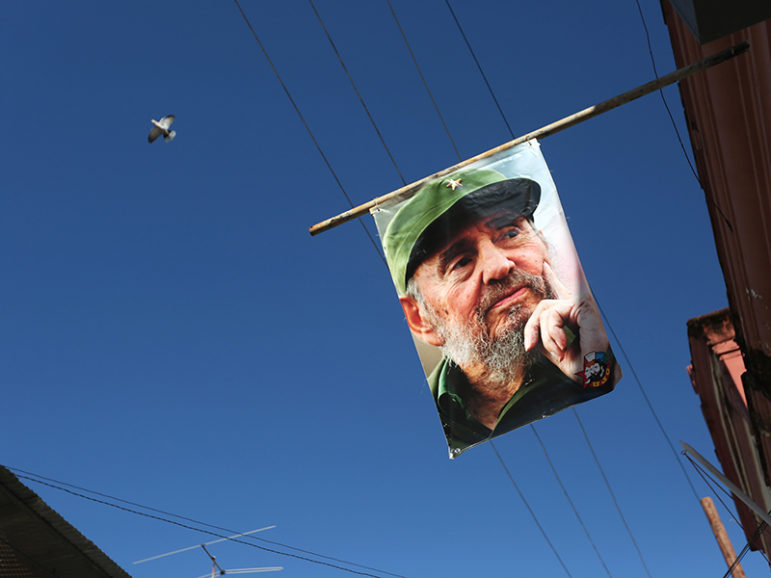(RNS) Fidel Castro was the man who first taught me to be afraid of death.
It was during the Cuban missile crisis, and I was 7 years old.
I remember my parents sitting in the den, watching the television – and shuddering. The reason was clear; there was the threat of Soviet missiles aimed directly at our country.
My parents’ fear was contagious. It leapt across the room and entered my soul. That was the day that I first learned to be afraid of death.
And now, the man who was my first “malach ha-mavet,” or angel of death, is himself dead.
I am not mourning Fidel Castro.
I am not mourning Fidel Castro, because I live in south Florida, surrounded by his victims. Those are the Jews who fled after the Castro revolution nationalized their homes and businesses.
These Jews are proud to be “Jewbans,” and they carry within them a sense of sadness and enduring exile.
In the words of the Cuban Jewish poet José Kozer:
The store in Havana has turned to dust, and my father, dust-coated Jew, comes home each day with a rye loaf under his arm.
All the stores in Havana have been shut,
The workers, all fired up, have started marching;
again, the old dust-coated Jew, my father
carries the Ark of the Covenant on his way out of Cuba.
I am not mourning Fidel Castro, because I have no love for leftist revolutions.
Once upon a time, I did. Like many of my generation, I confess: As a teenager, I had posters of Che Guevara in my room.
He was a romantic figure — so suave and dashing. When the U.S.-backed Bolivian army assassinated him, that act almost elevated him to a Jesus-like status. Esquire magazine once did a parody of the Last Supper, putting Che in Jesus’ chair.
Except: Guevara was a terrorist. He had no compunction executing masses of helpless peasants. He died in a failed attempt to extend the communist revolution to Bolivia.
Guevara made leftist, revolutionary violence “cool.” He created a cult of violence that allowed leftists to embrace — or, at the very least, to rationalize — Palestinian violence against the Jews.
Which leads to: I am not mourning Fidel Castro, because he was not “good for the Jews.”
The Castro regime was deeply anti-Zionist and anti-Israel. Cuba severed diplomatic relations with Israel in 1967. Castro and Guevara served as role models for the Palestine Liberation Organization. Cuba was involved in training Palestinian fighters. The Cuban government decorated the late Yasser Arafat.
Perhaps this was because Castro simply admired revolutionaries — of any stripe.
No matter. He was directly responsible for the death of many Jews, and many others. He trained PLO terrorists, and they learned their lessons well.
I am not mourning Fidel Castro, even though his relationship with the Jews was complicated.
With all that I have said, you would have thought that Castro hated the Jews.
Not so.
In the Patronato, the main synagogue/Jewish community center in Havana, there was a photograph of a Hanukkah party in which Castro embraces the children of the community, and dances with them.
Castro had often quipped that he believed himself to be of Jewish ancestry — a not-so-unreasonable claim, considering the popularity of Castro as a Sephardic surname.
Perhaps he knew that Maimonides was a Sephardic Jew; that might be why Cuba co-sponsored a UNESCO conference commemorating the 850th anniversary of the birth of the great philosopher.
And, while Castro was clearly anti-Zionist, he never blocked Jewish emigration to Israel; on the contrary, members of socialist Zionist parties made official visits to Cuba.
In Cuban schools, the Holocaust is taught as a uniquely Jewish tragedy, not simply another example of fascist crimes.
And, let the record note: The Holocaust memorial in the Havana Jewish cemetery is the oldest in Latin America – erected in 1946.
Finally, I am not mourning Fidel Castro because communism is a moral and spiritual failure.
A moral failure: Communism has left a pile of bodies in its wake — between 85 million and 100 million people. In that sense, it far outstripped Nazism in the depth of its evil.
A spiritual failure: Decades ago, Will Herberg wrote:
This Marxist religion was in part illusion, and in part idolatry; in part a delusive Utopianism promising heaven on earth in our time, and in part a totalitarian worship of collective man. As religion, Marxism had proven itself bankrupt.
It is ironic.
Both Judaism and communism emerge from similar impulses.
They both have linear views of history. In Judaism, the human story is progressing toward tikkun olam and perfection. Communism came out of a fevered impulse to create a society in which there would be no poor and no rich.
That is why the Communist Party was a haven for so many Jews. They may have given up on God and Torah. But they needed a place to put their world-repair energies.
Jewish ethics forbid us to celebrate the death of an enemy. “Do not rejoice when your enemy falls,” counsels the book of Proverbs. At the Passover seder, as we name the plagues that befell Egypt, we spill drops of wine to remember the innocent victims.
So, no – I am not celebrating Castro’s death.
But he was the last Pharaoh in the Western Hemisphere.
And that means that there is now one less Pharaoh in the world.
(Rabbi Jeffrey Salkin is the spiritual leader of Temple Solel in Hollywood, Fla., and writes the Martini Judaism blog for RNS)






